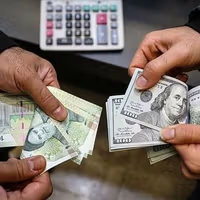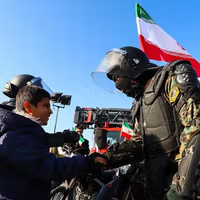Iran Allocates 13.6 Billion Euros For Import Of Essential Goods
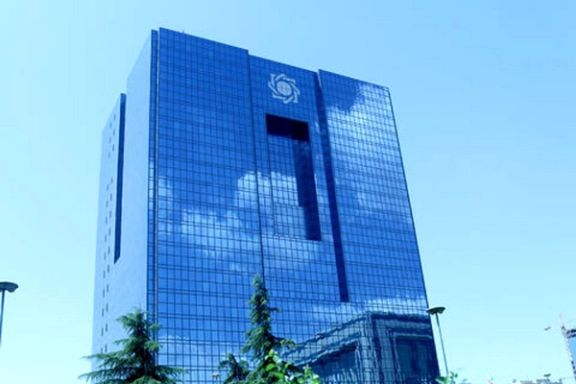
Iran's Expediency Discernment Council has approved the allocation of 13.6 billion euros for the import of essential, agricultural, pharmaceutical, and raw materials.

Iran's Expediency Discernment Council has approved the allocation of 13.6 billion euros for the import of essential, agricultural, pharmaceutical, and raw materials.
As announced by the Council’s Supreme Supervisory Board on Wednesday, the authorization allows the government and the Central Bank to utilize the allocated funds "solely for the import of essential agricultural goods, pharmaceuticals, and their raw materials, as well as medical consumables."
Amidst the drastic devaluation of the Iranian currency in recent years, the government has resorted to providing foreign currency at cheaper exchange rates to importers of a pre-approved list of essential goods, including medicine, food, and crucial raw materials. Importers are mandated to procure and transport the approved goods into the country.
The official exchange rate of the Iranian rial, subsidized by the state, stands at 285,000 rials per US dollar, significantly lower than the open market rate of about 570,000 rials per dollar. The official rate is exclusively utilized for importing essential goods, aiming to shield Iranian consumers from sudden and dramatic price increases due to sanctions.
However, concerns have been raised regarding the misuse of allocated foreign currency, with reports indicating that some individuals and companies fail to import the agreed-upon goods or sell them at inflated prices after importation.
In a recent example, Debsh company, responsible for a significant portion of the country's tea imports, reportedly received an astounding $3.37 billion in foreign currency from the government at a preferential exchange rate for tea and machinery imports between 2019 and 2022. However, reports suggest that the company has sold $1.4 billion of the currency on the free market at higher rates.
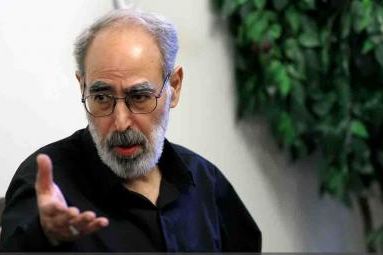
Abolfazl Ghadiani, once an ally and now a vocal opponent of Iran’s Supreme Leader, has unleashed criticism against the electoral process, denouncing it as "staged, scripted, and engineered."
In a statement issued on Wednesday, Ghadiani, a prominent political activist, urged "freedom-seekers, justice-seekers, and government opponents to boycott the upcoming elections," citing concerns over the legitimacy of the electoral system.
Directing his ire at Supreme Leader Ali Khamenei, Ghadiani labeled him as "power-hungry, delusional, and deceptive," lambasting the Islamic Republic for deceiving Iranians with false promises of government reform and manipulating them into participating in flawed electoral processes.
Highlighting the intelligence of the Iranian people, Ghadiani praised their past decisions to boycott previous elections, emphasizing their rejection of participation calls with resolute negativity.
Ghadiani also accused certain political activists of employing "strange justifications" aimed at perpetuating the regime's survival by artificially bolstering voter turnout.
His remarks took aim at 110 reformist political and media activists who recently called for participation in the upcoming parliamentary elections and advocated for supporting "moderate candidates." However, their appeal was met with widespread backlash, with many accusing them of "power-seeking and profiting at the expense of people's blood."
Recent years have witnessed a significant decline in voter participation due to severe economic challenges, extensive suppression of dissenting voices, and oversight by the Guardian Council. The decline has precipitated a crisis of legitimacy for the Islamic Republic.
With parliamentary and Assembly of Experts elections scheduled for March 1, expectations loom for historically low voter turnout, marking the first elections since the 2022 uprising sparked by the death in morality-police custody of Mahsa Amini.
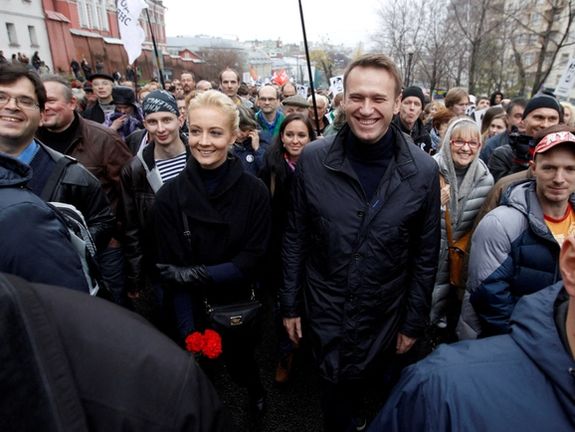
A newspaper previously inked to the Islamic Republic's Supreme Leader, Ali Khamenei, has accused Russian President Vladimir Putin of murdering opposition figure Alexei Navalny.
Simultaneously, at least two reports in the Iranian press have accused Putin and Russia of interfering in Iran's internal affairs.
The conservative Jomhouri Eslami newspaper, founded by Khamenei in 1979, charged in its February 20 edition that "Alexei Navalny is the latest victim of Russia's rulers. His murder is perhaps the most gruesome crime ever committed by Moscow's rulers." The newspaper listed 25 opposition figures it claimed were killed by Russian government agents, including Gazprom official Leonid Shulman, industrialist Igor Nasov, editor Vladimir Gorkin, and former KGB agent and critic of Putin, Alexander Litvinenko.
The newspaper pointed out that although execution has been abolished in Russia, there is a long list of those who have been killed with guns, in swimming pools, by poisoning, stabbing and other methods.
Such outright and open criticism is rare in Iran’s government-controlled and censored press, considering the close military and diplomatic alliance between Moscow and Tehran.

The daily called on the international human rights community to form a fact-finding committee to investigate Navalny's death, describing it as "yet another political murder in Russia" and evidence of "a modern despotic government which attempts to terrify its opponents by suppressing and eliminating its enemies."
Jomhuri Eslami concluded that "as a political leader who kills his opponents, Putin should not be trusted," warning the Iranian government of Russia's systematic disregard for the interests of other countries.
Earlier, Iranian politicians including Foreign Minister Mohammad Javad Zarif and the former chairman of the Iranian parliament's National Security and Foreign Policy Committee reiterated that Russia should not be trusted as an ally.
In an interview with Khabar Online website, former diplomat Fereydoun Majlesi pointed out the conflict between Iran and Russia's interests. He highlighted Russia's delays in delivering the Bushehr Power Plant to Iran, its rivalry in oil and gas markets, and its use of Iran as a shield in its conflict with Ukraine. Majlesi emphasized the need for Iranian officials to ensure that ties with Russia do not hinder Iran's relations with other countries.
Majlesi said that Russia has never helped Iran to further its foreign trade. On the other hand, the Russians delayed the delivery of the Bushehr Power Plant to Iran for 30 years. He pointed out that Russia is Iran's rival in the oil and gas markets. He also charged that Russia has been using Iran as a shield in its war against Ukraine. He added that by encouraging conflicts in the Red Sea, the Russians wish to disrupt the flow of oil through the region.
In another development related to Russia's interference with Iran's internal affairs, Nader Ghazipour, a former member of the Iranian parliament (Majles) from Urmia, who has been disqualified from running for the next parliament, alleged Russia's involvement in his disqualification.
Ghazipour told Khabar Online in Tehran he is aware that he has been disqualified for criticizing the government for its one-sided ties with Moscow. He said: "I was the only member of the Iranian parliament who made a speech against Russia at an open session of the Majles."
Despite these occasional media criticisms, the Iranian regime continues to supply offensive weapons to Moscow, including kamikaze drones, and according to the latest news, ballistic missiles.
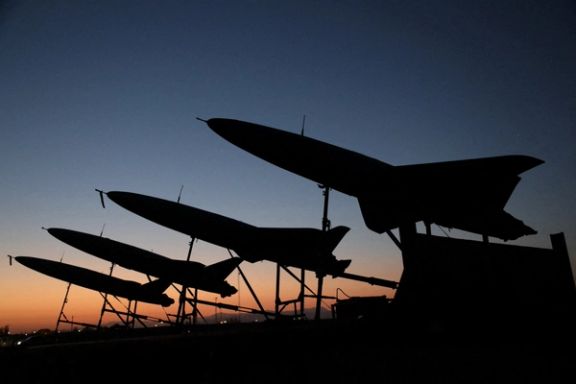
Despite global sanctions, Iran has imported at least $236 million worth of aircraft and drone engine parts over the past 10 years from countries including Turkey, the UAE, Germany and even Ukraine and the US.
Data by the Islamic Republic's customs organization, scrutinized by Iran International, show that around $26 million worth of items listed as prohibited under the US Treasury's sanctions against Iran was imported to the country only in the first eight months of the current Iranian year, which started on March 21.
Earlier in the month, the head of a top unit at the US Department of Homeland Security said that "sensitive" materials are showing up overseas -- in Iranian weapons. "The Iranian drones that are being recovered on the battlefield in Ukraine, that are being recovered on the battlefield throughout the Middle East, they do have sensitive US communications systems and they have sensitive microelectronics," Jim Mancuso, the assistant director of the Global Trade Division at Homeland Security Investigations, told ABC News. Iran, China and Russia are all "attempting to illegally acquire" US technology, he added.
Although Iran has numerous tools to circumvent the sanctions, including manipulating the documents about its trade of sensitive know-how, data about import and export of drone parts are still decipherable in the official customs documents.
The multifunctionality of parts used to manufacture drones as well as outsourcing the production of some parts to private companies and using intermediaries to buy the materials, have all contributed to the failure of efforts to prevent the development of Iran's drone industry. According to security and military experts, one of the main reasons Western countries have not yet been able to curb the flow of foreign parts to Iran’s drone program is the multifunctionality of imported parts as it is unclear whether a particular part is used in a civilian crop-dusting aircraft or a military drone.
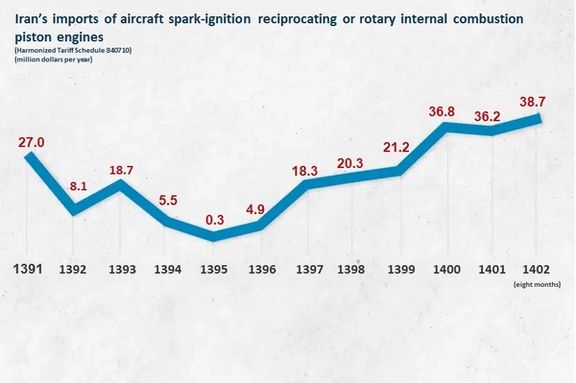
In June last year, the US Department of the Treasury issued a guide on Iran's drone industry. The 11-page “Guidance to Industry on Iran’s UAV-Related Activities” warned traders about items used by Iran in the manufacture of drones that may be subject to US sanctions. A table of 13 categories of items used in the production of drones included engines, navigational equipment, and electronics. The table listed the Harmonized Tariff Schedule (HTS) code, used internationally in customs information, and every traded item assigned a standardized international tariff code.
According to Iran’s custom organization statistics, a total of $236 million worth of “aircraft spark-ignition reciprocating or rotary internal combustion piston engines”, otherwise known as HTS 840710, were imported into the country from March 2012 to November 2023. The import of such products hit its lowest point in 1395 (the Iranian year from March 2016 to March 2017) at around $300,000, but the figure has been on rise ever since.
Following the Russian invasion of Ukraine, the import of these aircraft propulsion parts increased significantly, with the figure in the eight months ending in November exceeding that of the entire previous year. Seventy-five percent of the total imports in the 10-year timespan originated from Turkey ($52.8 million), Hong Kong ($50.9 million), the United Arab Emirates ($43.7 million), and China ( $28.8 million).
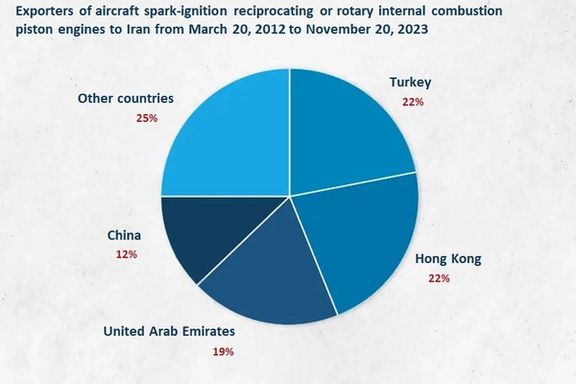
In addition to these primary sources, many European countries are also among the exporters of such equipment to Iran, most from Germany, followed by Ukraine ($2.1 million worth) and Slovenia.
While Ukraine has been exporting to Iran, the situation has now flipped, with Iran supplying drones and missiles to Russia to be used in the war on Ukraine. Reuters cited six sources as saying that Iran has provided Russia with around 400 powerful surface-to-surface ballistic missiles. Ukrainian President Volodymyr Zelenskyy said earlier this month that approximately 360 Iranian drones have been shot down in Ukraine since the beginning of January.
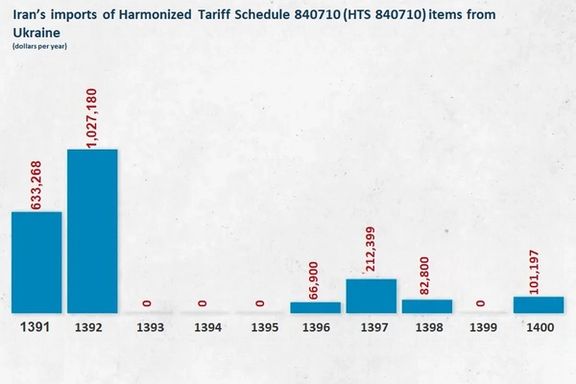
In February 2022, when Russia invaded Ukraine, Iran imported approximately $31,000 worth of parts and components of aircraft propulsion units used in drone manufacturing from Ukraine. Additionally, the United States also had a share in Iran’s procurement of drone parts, with more than $50,000 worth of equipment that took place in 2013 and 2018.
Iran went from being an importer to a global exporter, going from nearly none in 2020 to approximately $26 million in the first eight months of Iranian year 1402 (March to November 2023). Venezuela has been the first destination for the export of aircraft propulsion parts, with about $20 million worth of exports, which accounts for approximately 37% of the total exports of HTS 840710 items. Tajikistan follows with around $14.4 million, and Ethiopia with about $8.6 million.
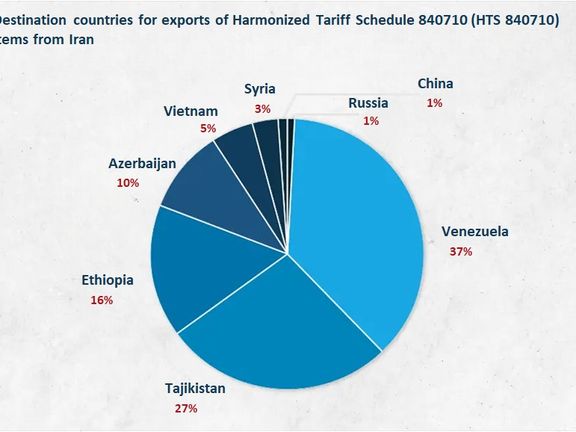
Farzin Nadimi, a defense and security analyst and a senior fellow of the Washington Institute, said in an article in November 2022 that and Venezuela began their collaboration in the production of unmanned aerial vehicles in early 2000s. The collaboration progressed to the point where the Islamic Republic established a drone production line for Venezuela in 2012.

A recently unveiled document has revealed that 16-year-old Nika Shakarami was raped by state-backed security during the Women, Life, Freedom protests.
The document, circulating on social media and seemingly discovered among a trove of files accessed after a hacktivist group breached the servers of the Iranian judiciary on Tuesday, contains evidence confirming that Shakarami had been subjected to rape amid a state sanctioned campaign of sexual violence as documented by rights groups.
The trove of documents obtained by the hacktivist group Edalat-e Ali covers a wide range of sensitive topics, spanning from internal discussions within the National Security Council following Mahsa Amini's death to efforts aimed at curbing unauthorized VPN vendors, protests against the 2020 employment examination, and cases related to economic corruption.
Abbas Masjedi Arani, head of the Forensic Medicine Organization has sent the "very confidential" letter to the Supreme National Security Council, explicitly stating, "In the genital examination, signs indicating assault or rough sexual intercourse were evident."
Nika Shakarami, a 16-year-old, was abducted and murdered by security forces during the anti-regime protests which swept Iran in 2022 following the death of Mahsa Amini in police custody.
Nika's final communication with a friend in September detailed how security forces were pursuing her on Keshavarz Boulevard in Tehran before she mysteriously disappeared. Her family identified her body ten days later, revealing signs of torture, abuse, and beatings inflicted by security forces.
Government agents later seized Nika's body from Khorramabad and secretly buried her in a village in Lorestan, located in western Iran.
The aftermath of Mahsa Amini's death saw over 500 civilians, including children and teens like Nika, lose their lives in the ensuing uprising.

The Czech Republic has extradited a suspect to the United States accused of plotting the Tehran-backed murder of a prominent critic of the Iranian government.
Polad Omarov was handed over to US authorities at Prague's Vaclav Havel Airport on Wednesday morning after his arrest in January last year. Despite the Justice Minister's ruling in favor of extradition back in July, the process encountered delays due to the suspect's appeal to the constitutional court, which was ultimately rejected.
Together with co-defendants Rafat Amirov and Khalid Mehdiyev, Omarov is charged with offenses including murder-for-hire and money laundering in connection with an alleged assassination attempt believed to be backed by Tehran. The target of the attempted assassination is a US citizen residing in Brooklyn, New York, known for vocal criticism of the Iranian government.
US authorities did not reveal the identity of the alleged victim when detailing the charges.
Mehdiyev had previously faced arrest in New York in 2022 for possessing a rifle near the residence of journalist Masih Alinejad, the target of multiple Tehran-backed assassination attempts for her activism against the regime.
In a separate incident in 2021, US prosecutors indicted four individuals suspected of being Iranian intelligence operatives, alleging their involvement in a plot to abduct a journalist and activist in New York. Though the target was not explicitly named, Reuters confirmed the intended victim to be Alinejad.
US prosecutors have disclosed that Omarov held residency in both the Czech Republic and Slovenia. However, the Czech Justice Ministry clarified on Wednesday that he is, in fact, a citizen of Georgia.

